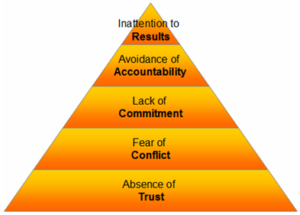Mentor Article
Why Your Team is Inherently Dysfunctional and What to Do About It
Our Mentors
Bob Halagan
Halagan Law Firm, LTD.
Roben Hunter
Hunter Advisors, PLLC
Casey A. Mattson
JM+SC Futurity
Gary Sorenson
Insurance Brokers of Minnesota
Kevin Lanigan
Carlson Estate Planning
Sheri Stolp
The Stolp Group
Michael Sherrill
Sherrill Law Offices
Sharon Berglund
Berglund HR Consulting
Mark Hegstrom
Waterfront Financial Group
Suzie Meier
Red Technologies Inc.
Bruce McAlpin
The McAlpin Team
Edina Realty
Shaun Corbin
First Minnesota Bank
Gayle Noakes
Gayle Noakes Supervisor Success
Stacey R. Edwards Jones
Jones Law Office
Kelli Hoskins, Master Business Coach
Jun 1, 2014
 This is a little story about four people named Everybody, Somebody, Anybody, and Nobody. There was an important job to be done and Everybody was sure that Somebody would do it. Anybody could have done it, but Nobody did it.
This is a little story about four people named Everybody, Somebody, Anybody, and Nobody. There was an important job to be done and Everybody was sure that Somebody would do it. Anybody could have done it, but Nobody did it.
Somebody got angry about that because it was Everybody’s job. Everybody thought that Anybody could do it, but Nobody realized that Everybody wouldn’t do it. It ended up that Everybody blamed Somebody when Nobody did what Anybody could have done.
Have you ever experienced this kind of frustration in your business? If you have employees then I’m pretty sure the answer is a resounding ‘Yes’.
Studies have shown that business owners and managers spend up to 50% of their time dealing with unproductive employee issues. If time equals money in your business, then 50% of your time dealing with unproductive issues equals a lot of money. So why is this? According to Patrick Lencioni, author of the book ‘The Five Dysfunctions of a Team’, it’s because teams are inherently dysfunctional. Why? Because they are made up of imperfect human beings. As soon as the reality of business problems is re-introduced to a situation, people revert back to the behaviors that put them into the difficult position in the first place. The business that has the ultimate competitive advantage is the one who’s team is disciplined enough to master the daily behaviors that overcome these dysfunctions.
What Are The 5 Dysfunctions of a Team?
- The absence of trust is the failure on the part of team members to understand and open up to one another. A team who does not trust each other cannot build a successful and profitable business. Building trust so team members are willing to show vulnerability and engage in passionate discussion or debate is the foundation of real teamwork.
- The fear of conflict comes as a result of people holding back their constructive opinions and genuine concerns. It’s very difficult for team members to engage in constructive conflict if they don’t trust one another. Teams need to be willing to engage in open, constructive, ideological debate and the best arena for this kind of debate is meetings.
- This leads to a lack of commitment because the team fails to buy into decisions. It’s difficult for people to buy into a plan or decision if they feel like nobody listens to them or cares about their opinion. Most reasonable people don’t have to get their way in every discussion, they just need to be heard and know their input was considered and responded to. It’s important to recognize that it’s not a consensus thing, often it’s necessary for the leader to make a decision even if there’s disagreement at which point everybody needs to commit to it. Give your team the opportunity to weigh in first so they can really buy in.
- Most business owners hate holding people accountable because they want to avoid interpersonal discomfort so they repeatedly tolerate undesirable behavior. It’s this avoidance of accountability that lets people off the hook for what they signed up for, for high standards of performance and behavior. It’s easier to hold people accountable when they have bought in and committed to the same plan. And it’s easier to build a successful, profitable business when you are willing to hold people accountable.
- This leads us to the ultimate dysfunction… inattention to results. When individual ego gets in the way, the tendency of team members is to seek out individual recognition, attention or benefit at the expense of the collective result i.e. the goals of the business.
Sports are so prevalent when it comes to teams because there is a clear score at the end of the game that determines whether you succeeded or failed. There is little room for ambiguity which means there is little room for subjective interpretive ego-driven success. It doesn’t matter how good an individual player is if the team keeps losing. Great athletes’ egos are usually tied to a clear collective result: the team winning the game and ultimately the championship.
Too often we base our team’s performance on goals and objectives that mean very little to the individual team members. Profit, while it’s one of the results we pursue that determines if we win the game, is not actionable enough. Set goals, compensation and rewards around what inspires your team members and tie it to what they do or can impact on a daily basis e.g. Revenue, Expenses, New Customer Acquisition, Customer Retention, Employee Retention and Product Quality.

